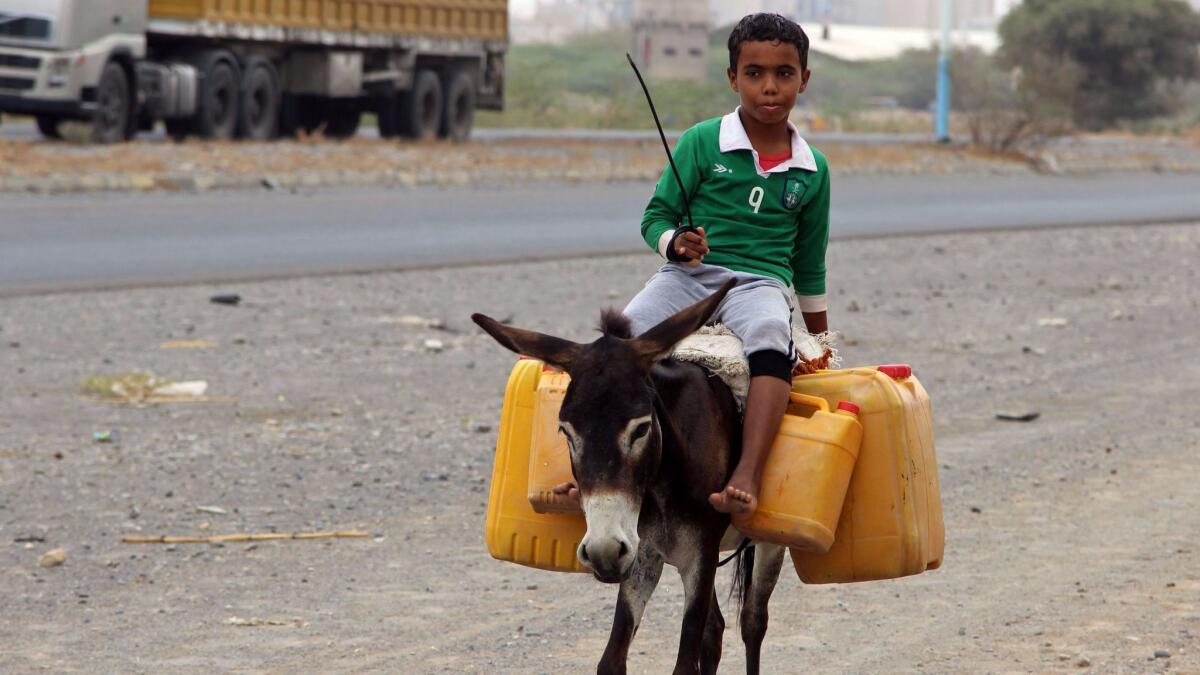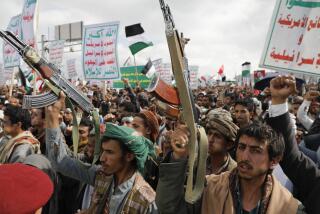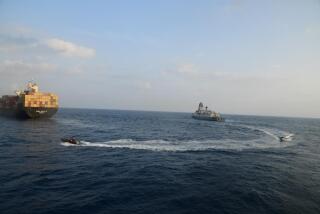In war-torn Yemen, battling a devastating food shortage depends on a key Red Sea port

As Yemen has faced fighting between Houthi rebels and a coalition of Persian Gulf states, the country has turned into a crucible of suffering.
Almost two-thirds of the nation’s 26 million people are suffering from food shortages, with more than 7 million acutely malnourished, according to United Nations officials. A child dies every 10 minutes in Yemen, UNICEF said, for reasons including diarrhea, breathing infections and malnutrition.
A comprehensive embargo by the Saudi Arabia-led coalition has ground the economy to a halt. Coalition airstrikes are blamed by humanitarian groups and activists for the majority of the more than 10,000 civilians killed during the fighting and for leaving the country’s already shaky infrastructure in tatters.
The Houthis, meanwhile, have managed to maintain control of the Red Sea port of Hudaydah, the primary entry point for most of the country’s food imports.
In recent weeks, the government in exile of Yemeni President Abdu Rabu Mansour Hadi along with an alliance led by Saudi Arabia and the United Arab Emirates have geared up for an offensive to take Hudaydah.
The coalition maintains that Iran, a nemesis of Saudi Arabia, provides weapons and ammunition for the rebels via the Hudaydah port and that it is an important source of income for the Houthis, who ousted Hadi’s government in 2014.
The coalition launched a counterattack against the Houthis in March 2015, after the group had seized the capital, Sana. The group later captured the country’s economic hub, Aden.
In response to calls for an arms embargo on the Houthis, the U.N. created its own verification and inspection mechanism to search ships entering Hudaydah to expedite aid deliveries.
Saeed Wahabi, a Saudi analyst based in Dubai, said in a phone interview that with more than 300 miles of coastal areas to police, some vessels would be able to continue delivering weapons and equipment.
Wahabi and others also said Houthis recently told Hudaydah merchants that there would be an increase in the cost of doing business to pay for the war effort.
Mohammad Baharoon, director of the Dubai Public Policy Research Center, said in an interview that both Saudi Arabia and the Emirates had proposed in recent months that the U.N. take over the port’s management to avoid confrontations.
But Jamie McGoldrick, the U.N.’s humanitarian coordinator in Yemen, said via email that he had not seen any details of such an offer.
Several local residents said any military operation to take the port, which was damaged by coalition strikes in August 2015, would hurt civilians more than the belligerents.
“This will be a disaster by all measures. We have 1 million people in the city, 2.6 million in the province around it, many of them refugees from other parts of Yemen,” Mustafa Bdeyr, head of the journalists union in Hudaydah, said in a phone interview.
“If something happens here, you can’t escape,” Bdeyr said. “They get us from the sky with planes, and ships in the water, and by land there’s fighting… we have nowhere to go.”
Yahya Kurd, a journalist, said in a phone interview that conditions in Hudaydah were already at the breaking point.
“There is no food. No water. No electricity. The prices are too high, and medicines… their prices are crazy,” he said.
Kurd said state employees in Hudaydah, like many other parts of the country, haven’t been paid since September in many cases.
The central bank in Sana, the U.N. says, has not been able to pay the country’s 1.5 million public servants, including teachers, nurses and doctors as a result of the economic blockade on the country.
“Why is the world interested in creating a famine of biblical proportions on top of all the problems we have … [and] which is wholly preventable?” Jan Egeland, head of the Norwegian Refugee Council, said in a phone interview.
“Eighty percent of food aid comes through Hudaydah, ” he said. “If it is attacked, that lifeline will be cut and for sure there will be a famine for millions of people.”
Wahabi said he would expect the operation to take Hudaydah would involve a multipronged offensive with troops advancing from the Midi district, 100 miles north of Hudaydah and near the Saudi-Yemeni border; from the waters before the port itself; and from north of the port of Mocha, roughly 86 miles south.
UAE and Saudi planners had reportedly called on the Pentagon to take a more active role in anti-Houthi operations, including the attack on Hudaydah.
The U.S. already provides intelligence, munitions and midair refueling to Arab coalition aircraft.
Although U.S. special operations forces have been with coalition troops in past operations against Al Qaeda in the Arabian Peninsula, known as AQAP, in Yemen, the commandos are not expected to be involved in the Hudaydah mission.
“There are deep concerns here about the secondary effects of the operation,” said a U.S. defense official, who wasn’t authorized to speak publicly on the matter. “But there are also concerns about this war because that’s what is causing the humanitarian crisis in the first place.”
On Wednesday, a bipartisan group of 16 congressional members sent a letter to Defense Secretary James N. Mattis exhorting him to brief lawmakers on the nature of “U.S. engagement in a potentially catastrophic Saudi attack” on Hudaydah.
A letter released last month by 55 members of the House of Representatives also raised concerns that anti-Houthi operations would “take too many resources away” from fighting AQAP, thought to be Al Qaeda’s most dangerous franchise. The group has taken advantage of the chaos in Yemen to rapidly expand its presence.
Its leader, Qassem Rimi, said in an interview with the group’s media branch in March that the jihadists fight with pro-government forces, including recipients of the coalition’s largesse, against the Houthis.
“We have fought with all the Muslims in Yemen and with all the Muslim groups. We fight with the Salafists, with the Muslim brotherhood … and with our brothers from the sons of the tribes and the people of Aden,” said Rimi.
This week, Saudi Arabia’s deputy crown prince and defense minister, Prince Mohammad bin Salman, ruled out dialogue with Iran regarding Yemen.
“There is no common ground between us and Iran,” Salman in an interview with the Saudi-owned MBC channel.
He said Iran’s ideological underpinnings mean “it must control the Muslim world.”
“How can I come to an understanding with this?”
Bulos is a special correspondent. Times staff writer W.J. Hennigan in Washington contributed to this report.
More to Read
Start your day right
Sign up for Essential California for news, features and recommendations from the L.A. Times and beyond in your inbox six days a week.
You may occasionally receive promotional content from the Los Angeles Times.







